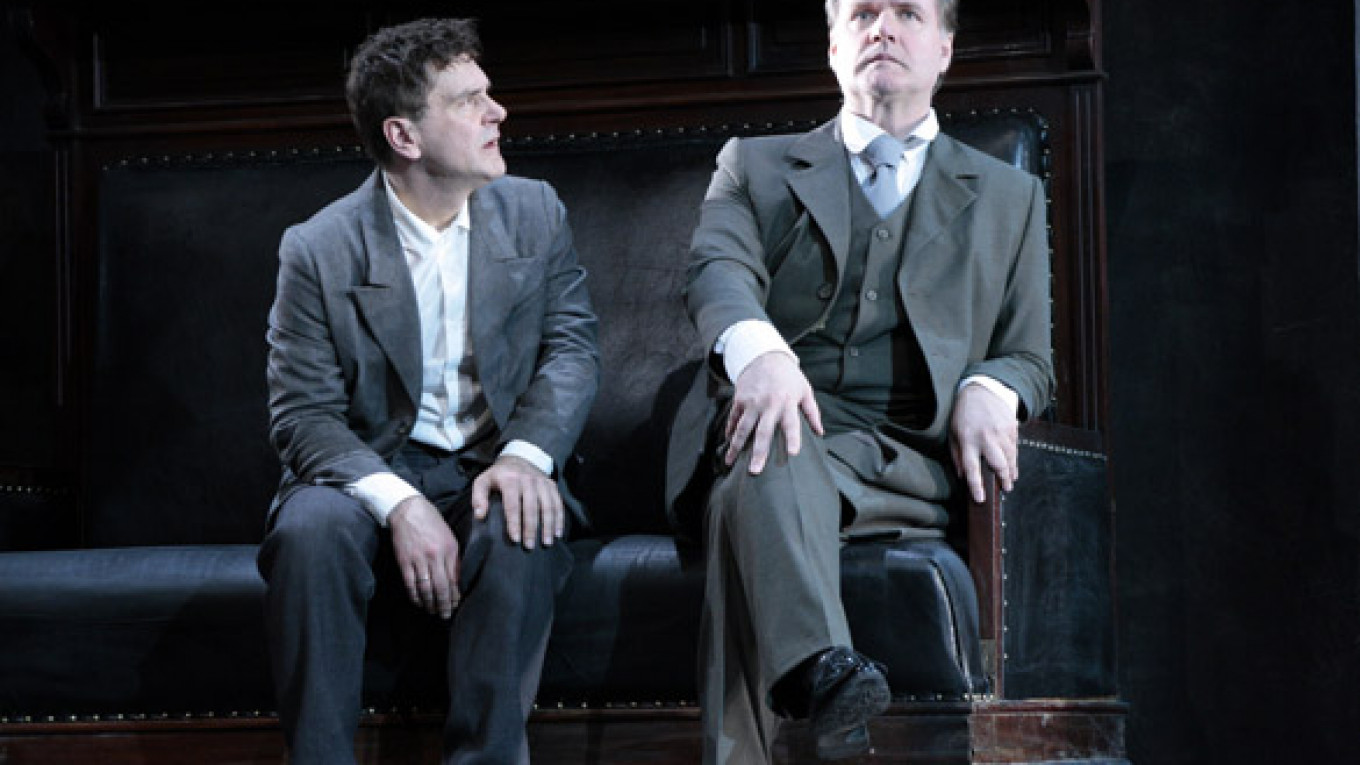In theater, at least, Anton Chekhov is as much Russia’s “our everything” as Alexander Pushkin. Sure, there are a few contemporary playwrights who loudly proclaim their desire to toss Chekhov overboard from the proverbial ship of contemporaneity, but that is an understandable tactical stance. Chekhov is the 900-pound gorilla in any room where people are talking about Russian drama.
His characters, his plots, his settings and his intonations are so familiar as to be akin to subconscious thoughts or a second skin to most any Russian actor or spectator.
Rimas Tuminas, the renowned Lithuanian who is entering his third season as the artistic director at the Vakhtangov Theater, can come to Chekhov from a different angle. And that is surely what he did in his new production of “Uncle Vanya” at the Vakhtangov.
This is a nervous, often grotesque, take on the story about people’s lives wasting away in the country. Tuminas sought to find the humor in Chekhov’s pining, pensive, ineffectual anti-heroes and heroines, and on occasion he succeeded.
As Sonya, the plain young woman who is hopelessly in love with the local country doctor Astrov, Maria Berdinskikh is hapless and endearing all in one. Quick to smile and prone to pessimism, she is a fragile soul trapped in desperate straits.
In one powerful moment, Astrov (Vladimir Vdovichenkov) rudely takes her head in his hands as if it were a sack of potatoes, stuffs a hat on her head, then shoves her away with indifferent disgust. Sonya, befuddled by the physical attention, wanders off with a blissful grin on her face.
The fringe characters are a barrel of laughs. Yury Kraskov, as the impoverished neighbor Telegin, and Galina Konovalova, as the wildly eccentric old nanny Marina, are borderline manic. The ever-present Telegin is always up to something strange – like tossing glasses in the air and letting them smash on the floor. Marina is aggressive, loud and crude.
Uncle Vanya (Sergei Makovetsky) is just another of many in a houseful of misfits. Not respected by his stuffed-shirt brother-in-law Serebryakov (Vladimir Simonov), not loved by Serebryakov’s beautiful young wife Yelena (Anna Dubrovskaya), and not taken seriously by his ghastly mother (Lyudmila Maksakova), he is ever the odd man out. This Vanya, dressed in a rumpled, ill-fitting suit, never quite understands what is happening. He pathetically tries to force his way into Yelena’s bed, trippingly bumbles his attempt to shoot Serebryakov, and ends up looking more dead than alive when everyone but Sonya abandons the house.
Tuminas presumably wanted to create a series of hard-edged caricatures, in terms of characters and scenes. He reads a stolen farewell kiss between Astrov and Yelena as a rough rape on a worktable, and an argument between Vanya and Serebryakov as a pushing, slapping fight as might occur between 5-year-olds.
Yelena is the most one-dimensional figure of the lot. Gorgeous, aloof, untouchable and unsure of herself, she is always mindful of the image she cuts — even after she is raped. She does not so much move or gesture as strike poses. She holds them a few moments before transforming her body into the next. She is always an object of interest, however — people constantly stare at her even when they are not talking to her.
Composer Faustas Latenas covers everything that happens under constant waves of sound. On occasion it has an illustrative function — as when a solemn tune suggests how important Astrov’s surveying equipment is to him — but more often its purpose is to induce various moods of irritation and confusion.
Adomas Yatsovskis devised the set that consists of three essentially empty rooms layered front-to-back and separated by drab, gray walls. On one side of the stage there stands an old-fashioned high-backed sofa; on the other is a messy work table next to an old measuring scale on which the dangling weight endlessly swings like the pendulum on a clock. Everything in the middle is wide-open space where, one begins to think, anything can happen.
Tuminas’ “Uncle Vanya” is anything but the usual Chekhov.
It is a big show, conceived meticulously. If one thinks back to some of the director’s brilliant productions of the past — Lermontov’s “The Masquerade,” Schiller’s “Mary Stuart,” Gogol’s “The Inspector General” and Griboyedov’s “Woe from Wit” come to mind immediately — this “Vanya” may seem rough at the edges and dark in the corners.
But whatever the case, chances are you have never seen Chekhov’s characters look like this.
“Uncle Vanya” plays Thurs., Sept. 28, Oct. 23 and 30 at 7 p.m. at the Vakhtangov Theater, located at 26 Arbat. Metro Smolenskaya. Tel. 241-1679. Running time: 3 hours, 25 minutes.
A Message from The Moscow Times:
Dear readers,
We are facing unprecedented challenges. Russia's Prosecutor General's Office has designated The Moscow Times as an "undesirable" organization, criminalizing our work and putting our staff at risk of prosecution. This follows our earlier unjust labeling as a "foreign agent."
These actions are direct attempts to silence independent journalism in Russia. The authorities claim our work "discredits the decisions of the Russian leadership." We see things differently: we strive to provide accurate, unbiased reporting on Russia.
We, the journalists of The Moscow Times, refuse to be silenced. But to continue our work, we need your help.
Your support, no matter how small, makes a world of difference. If you can, please support us monthly starting from just $2. It's quick to set up, and every contribution makes a significant impact.
By supporting The Moscow Times, you're defending open, independent journalism in the face of repression. Thank you for standing with us.
Remind me later.


